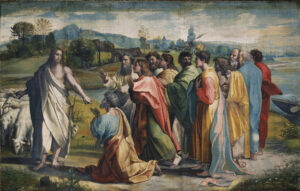Fr Neil’s homily on the Third Sunday of Easter, 1 May 2022
Jesus said to Peter, “Feed my sheep.”¹
The number three plays a big part in our gospel today. It is the third time that Christ had revealed himself after his resurrection. Three times Christ asks Peter whether he loves him, and three times Peter has to make his confession of devotion. Many have speculated that the threefold confession was required of Peter after he thrice denied knowing Christ on the evening of Maundy Thursday.
The number three is symbolic of completion. It is the number of the persons in the Trinity as God is complete in himself. Peter’s threefold denial of Christ² was a complete rejection of his discipleship — it required nothing short of a threefold act of restoration.
The Church in her wisdom has understood that there are two phases of conversion to Christ. The first is fundamental and dramatically entails the movement from the world that is marked by sin, death and alienation from God, the fallen world. This initial conversion is via the sacrament of baptism. Those who are baptised enter into the Kingdom of God via the waters of death and resurrection in Christ.
The second phase of conversion is the ongoing movement of the disciple towards God and is marked by the tears of repentance. Perhaps like Peter the apostle, as Christians our life of discipleship is shaped by joy, failure, death and resurrection. We quickly learn that our baptism was just the beginning of the journey of transformation into the likeness of Christ and not the end of it. There are moments in our walk with Christ when we just get it wrong and like Peter need a restoration of our relationship with Christ. Can I introduce you to the confessional? It is there that we can restore what we have lost through our own wilfulness or weakness — or both.
Peter’s denial on Maundy Thursday saw him stepping away from the path of discipleship. His going fishing recounted in today’s gospel is to resort to the life he had before Christ’s call to follow him. Peter was lost, and there was nothing he could do to put right the mistake he had make. If there had been no resurrection appearance here, Peter would have been trapped by his failure for the rest of his life. Yet the appearing of the Risen Christ signals the possibility of reconciliation and renewal for Peter. St Augustine of Hippo states: “Christ rose again in the flesh, and Peter rose in the spirit because, when Christ died in his passion, Peter died by his denial. Christ the Lord was raised from the dead, and out of his love he raised Peter.”³
The imagery in this gospel cannot be ignored. Peter is fishing when Christ appears on the shore. They had fished all night and caught nothing until Christ tells them to let the nets down one more time. They net a huge catch — similar to the time Christ first calls Peter and his companions to discipleship. It allows John to cry out in recognition, “It is the Lord.”
Peter’s encounter with Christ takes place by a charcoal fire; the only other place a charcoal fire is mentioned in scripture is when Peter is warming himself by the fire and denies knowing Christ three times.² At this fire, on the beach, Peter must declare his love for Christ in order to be restored. Only having done so is Peter called once again to follow Christ. Yet Christ makes it very clear what the end will be for Peter who will himself have to stretch out his hands to a crucified martyr’s death in Rome.
However, we have to note that words were not enough to restore Peter. Words of love are proved by the actions and Peter was commanded by Christ after each of his declarations of love to fulfil his mission and look after the sheep of God — the people of his Church. He was to become the rock again upon which Christ would build his Church.
We are not all apostles. But we are followers of Christ, and our words of declared love for Christ must be demonstrated by tears of conversion and the love of our neighbour, or else it is merely empty rhetoric. Of course the twofold manner of revealed love for God is not only in the way we care, support and aid those of our community and society but also how we worship God. This is hinted at in the the book of Revelation, were we glimpse an image of heavenly worship. This worship is marked by the declaration of God’s saving work: honour, might and power where the elders, the apostles, fall down in utter worship.
What direction is our worship aimed in? Where does it direct our gaze — to us, or to the heavenly glory of God?
¹ John 21:17
² Mark 14:66–72
³ Augustine of Hippo, Sermon 229n.1.4








 Posts
Posts